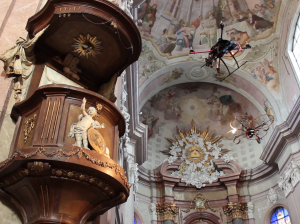CS Seminar series – 14:00, Friday, 12.02.2015, Room KN:E-2015
Tom Krajnik, University of Lincoln, UK
Abstract:
While robotic mapping of static environments has been widely studied, long-term mapping in non-stationary environments is still an open problem. In this talk, we present an approach for long-term representation of populated environments, where many of the observed changes are caused by humans performing their daily activities. We propose to model the environment’s dynamics by its frequency spectrum, as a combination of harmonic functions that correspond to periodic processes influencing the environment.
Such a representation not only allows representation of environment dynamics over arbitrary time-scales with constant memory requirements, but also prediction of future environment states and anomaly detection. The main advantage of the proposed approach is its universality – it can extend most of the environment models used in mobile robotics.
The proposed approach is applied to several environment representations created by a mobile robot autonomously patrolling indoor environments for several months. In particular, we apply the approach to occupancy grids, feature-based representations and topological maps and show that the approach can represent billions of observations with a few spectral components achieving compression rates up to 1:100000, significantly improves localization robustness in dynamic environments, allows for more efficient path planning, speeds-up tasks like object search or activity classification, and allows to perform 4D spatio-temporal exploration.
More details about FreMEn
